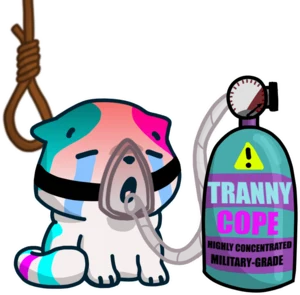https://www.ncbi.nlm.nih.gov/pmc/articles/PMC11063965/
Introduction
With the growing acceptance of transgender individuals, the number of gender affirmation surgeries has increased. Transgender individuals face elevated depression rates, leading to an increase in suicide ideation and attempts. This study evaluates the risk of suicide or self-harm associated with gender affirmation procedures.
Methods
This retrospective study utilized de-identified patient data from the TriNetX (TriNetX, LLC, Cambridge, MA) database, involving 56 United States healthcare organizations and over 90 million patients. The study involved four cohorts: cohort A, adults aged 18-60 who had gender-affirming surgery and an emergency visit (N = 1,501); cohort B, control group of adults with emergency visits but no gender-affirming surgery (N = 15,608,363); and cohort C, control group of adults with emergency visits, tubal ligation or vasectomy, but no gender-affirming surgery (N = 142,093). Propensity matching was applied to cohorts A and C. Data from February 4, 2003, to February 4, 2023, were analyzed to examine suicide attempts, death, self-harm, and post-traumatic stress disorder (PTSD) within five years of the index event. A secondary analysis involving a control group with pharyngitis, referred to as cohort D, was conducted to validate the results from cohort C.
Results
Individuals who underwent gender-affirming surgery had a 12.12-fold higher suicide attempt risk than those who did not (3.47% vs. 0.29%, RR 95% CI 9.20-15.96, p < 0.0001). Compared to the tubal ligation/vasectomy controls, the risk was 5.03-fold higher before propensity matching and remained significant at 4.71-fold after matching (3.50% vs. 0.74%, RR 95% CI 2.46-9.024, p < 0.0001) for the gender affirmation patients with similar results with the pharyngitis controls.
Conclusion
Gender-affirming surgery is significantly associated with elevated suicide attempt risks, underlining the necessity for comprehensive post-procedure psychiatric support.


TRAs: "Follow the science!" 
Unbiased researchers: "The science says you'll be more suicidal if you cut your healthy body parts off and try to cosplay as the opposite s*x." 
TRAs: "Not that science! It isn't affirming me! TRANSPHOBES!!!!!" 
This is why you don't treat body dysmorphia with plastic surgery or anorexia with weight loss. You don't affirm delusions or provide addicts with drugs. First do no harm. 












.webp?h=11)

Jump in the discussion.
No email address required.
1,500 trans people out of 90 million total is much rarer than I expectedPuts all the in perspective
in perspectiveI'm
This study doesn't compare suicide rates before and after gender surgeries. It compares to suicide attempts by people in the ER and uses people with vasectomies as a control. Am I missing something or does this study not show the things it says it does?
Jump in the discussion.
No email address required.
Nope OP is just r-slurred. The headline should be "post-op s who go to the emergency room are more likely to be there for a suicide attempt than cis people who go to the emergency room"
s who go to the emergency room are more likely to be there for a suicide attempt than cis people who go to the emergency room"
Jump in the discussion.
No email address required.
The surgery used to be considered a last resort partly because it isn't a particularly effective treatment for gender dysphoria and has a high chance of making the patient's body dysmorphia even worse. Encouraging anyone with any amount of Gender Dysphoria to slice their peepee up is akin to giving everyone with a peanut allergy an emergency tracheostomy with a dirty pen.
It's supposed to be reserved for people who are so inconsolably anguished by their body that they have a high likelihood of crashing out when they look at their peepee/breasts. It's not just supposed to be for some snowflake who decided they "feel" like something else.
Jump in the discussion.
No email address required.
I think you have things a bit backwards, in the past the surgery was considered essential and often mandatory to be able to transition at all. It's only in the last few decades that SRS has started to become more of an optional thing. It went from the norm to something a minority of s get done
s get done
Jump in the discussion.
No email address required.
So essential it was condemned by all professionals until the the last decade or so
Jump in the discussion.
No email address required.
Why do chuds think transitioning was invented in 2012 just because that's when they learned about it
Jump in the discussion.
No email address required.
More options
Context
More options
Context
Yeah anything talking about "transsexualism" in the past talked about "s*x changes".
Jump in the discussion.
No email address required.
More options
Context
More options
Context
More options
Context
u mean normal people
people
Jump in the discussion.
No email address required.
Some cis people are freaks albeit
Jump in the discussion.
No email address required.
Jump in the discussion.
No email address required.
Yeah yeah chuds threw the same temper tantrum at being labeled straight in the 1980s
Jump in the discussion.
No email address required.
More options
Context
More options
Context
More options
Context
More options
Context
Jump in the discussion.
No email address required.
The study looked at American hospital ER visits over a 20-year period (2003-2023) and compared the rates of suicide, suicide attempts, self-harm, and PTSD of ER patients aged 18-60 who'd had "s*x reassignment surgery" in the past five years to three other groups of ER patients seen in the same time period: female ER patients aged 18-60 who'd previously had a tubal ligation; male ER patients aged 18-60 who'd previously had vasectomy; and all adult patients aged 18-60 presenting with acute pharyngitis.
The paper never aimed to investigate the relationship between having, or claiming to have, a transgender identity and suicide and self-harm rates. It was solely interested in looking at people who'd undergone so-called "s*x reassignment surgery" to find out if there was a connection between having had this kind of surgery and the likelihood of showing up in a hospital ER due to suicide attempts, death, suicide/self-harm, and PTSD in the five years following the "s*x reassignment surgery."
None of the people in the study appear to have been categorized as "trans" on the basis of how they claimed to "identify" or how others assumed they "identified" at the time they showed up in ERs. All that seems to have mattered was if they had undergone "s*x reassignment surgery" in the previous five years.
Chances are, some of the people who had undergone this surgery no longer "identified as" trans when they had reason to go to ERs. Then again, maybe not. It's hard to tell because of clear-as-mud statements like this:
The hypothesis the researchers set out to test and their findings:
One of the most significant aspects of this study, in my view, is that it compared adults who became permanently and irreversibly sterile due to "s*x reassignment surgery" to adults who'd undergone other medical procedures that are usually done for the express purpose of making it nearly impossible for them to have children. Apparently, this was to try to get a sense of the extent to which the rates of suicide attempts, suicides, self-harm, and PTSD amongst the groups compared might be - or might not be - tied to their loss of fertility. Though obviously, to figure that out, the researchers would need to have looked at the reproductive histories of the patients compared.
Jump in the discussion.
No email address required.
Jump in the discussion.
No email address required.
Jump in the discussion.
No email address required.
Jump in the discussion.
No email address required.
The study shows that adults aged 18-60 who've willingly undergone permanent sterilization by getting castrating "s*x reassignment surgery" have much higher rates of suicide attempts, suicide, self-harm, and PTSD in the five years following that surgery than other adults aged 18-60 who've wilingly given up their ability to have children (or more children) through other kinds of surgery.
Since "trans people" are such a diffuse lot nowadays, there's no objective way to distinguish "trans people" from the rest of the population, and TIPs commonly lie about intending to get genital surgery one day, I dunno how a study could be done comparing different groups of TIPs.
Also, it would be ridiculous to classify TIPs who haven't had surgery as "pre-surgery" because the majority of TIPs have no plans to get genital surgery ever - and that's true even of the ones who say they're definitely going to get so-called "bottom surgery".
The only way to get a sense of whether the loss of the ability to have biological children played a role in the despair of the patients who had undergone "s*x reassignment surgery" would be to make note of their individual age and reproductive history.
Traditionally, most AGP TIMs who've had their balls cut off and their peepeees flayed did so after fathering children. Quite a few homosexual TIMs fathered children before getting genital surgery in adulthood as well. So, it's probably no skin off their noses to lose the ability to sire more kids. However, in the current century, all of the teenage boys and young adults of both sexes who've had sterilizing medical interventions - including surgeries to "affirm" their opposite-s*x gender identities - have undergone these medical "treatments" before they've had children. In many cases, "early transitioners" have had these sterilizing medical interventions and surgeries before they've ever had s*x - indeed, before they've ever so much as held hands with a romantic partner or had their first kiss.
Presumably, losing the ability to have biological children before you ever had a chance to do so in the first place would have a much worse effect on someone's mental health than losing that ability after already becoming a parent or having the chance to.
It would be hard to nail down a control group and also “trans-identifying people who identify exclusively as the opposite s*x” and have a group of people who identify that way, but get absolutely no medical intervention. It would be so difficult to do a study like that because, according to TRAs, "gender is fluid uwu". So, of course that's the TRA talking point if and when people bring up studies like this.
Jump in the discussion.
No email address required.
I accept your concession
Jump in the discussion.
No email address required.
More options
Context
Jump in the discussion.
No email address required.
More options
Context
More options
Context
More options
Context
It's circumstantial evidence that as strongly indicates your hypothesis of cause and effect as it does something you can't control for, like “ s that are willing to undergo GAS are fricked up lost causes with a stronger inclination to suicide attempts”, which would allow for the possibility of GAS to still be a net improvement on their odds.
s that are willing to undergo GAS are fricked up lost causes with a stronger inclination to suicide attempts”, which would allow for the possibility of GAS to still be a net improvement on their odds.
Jump in the discussion.
No email address required.
More options
Context
More options
Context
More options
Context
More options
Context
More options
Context
More options
Context
More options
Context